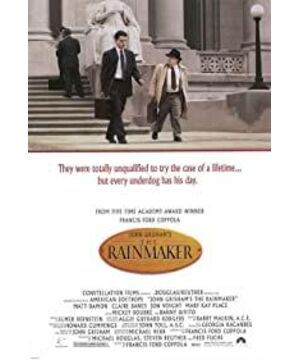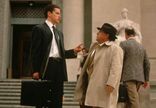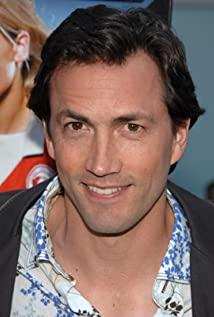While Rudy went head-to-head with the insurance company in court and in court, his partner Deck did everything he could to assist. Deck is an unlicensed lawyer, but he's been in the practice for six years, so he's more experienced than Rudy. For example, he knows how to get a place in this competitive and incentivized legal profession, although the method is a bit contemptible; he can also pass the law to support Rudy when the argument in court falls behind. When the insurance company fired key witnesses in an attempt to prevent Rudy from obtaining key testimony, it was Deck who identified the dismissed witness; When he provided important evidence—the insurance company’s internal administrative guidance—the defense lawyer jumped out and said that because the witness had been fired, the evidence was “stolen evidence” and the source of the evidence was illegal and did not possess Admissibility of evidence, therefore important evidence is excluded. This is when Deck calls for help from Bruiser Stone and learns from him a precedent that the stolen evidence is valid. So can the stolen evidence be used as evidence in court?
This issue involves the rule of exclusion of illegal evidence in the rule of evidence capacity. The illegality of evidence mainly includes illegal form, illegal procedure, illegal source, illegal content, and illegal subject. "Stolen evidence" is evidence of illegal origin and evidence of illegal acquisition procedures. In the United States, evidence of unconstitutional conduct must be excluded, while the exclusion of non-unconstitutional evidence is subject to the following limitations: the law generally or frequently applies to official acts of collecting evidence for use in criminal prosecutions; the law protects Interests consistent with or similar to those protected by the Constitution; defendants granted exclusion rights are those whose law was designed to prevent harm; wealthy courts weigh the costs of excluding the rule. For the evidence prohibited in the exclusion rule, in principle, it is only prohibited to be used to prove the defendant's guilt, and the defendant at this time is limited to the criminal defendant whose rights have been violated due to the inappropriate method of collecting evidence. It can be seen that in civil cases, the rules of competence of evidence are not so strict. In Germany, there are also restrictions on the prohibition of illegal evidence; and on the issue of the "fruit of the poisonous tree" in the use of illegal evidence, "only when it is highly probable that such evidence can be obtained without violating legal procedures. use this evidence".
Based on these theories, "stolen evidence" in the film's case should clearly not be excluded. First, the source of the evidence is not unconstitutional. The internal administrative guidance of the insurance company that was presented as evidence in court was brought out when an important witness was dismissed. The defendant thought it was "stolen evidence". Is it a secret to see whether this kind of administrative guidance is allowed to leave the company? , so whether it is "stolen" is controversial. Second, the internal administrative guidance of an insurance company does not involve trade secrets, but is just an ordinary business guidance statement, that is, a guidance on how the company's internal personnel work on weekdays, which is not privacy. Third, the administrative guidance within the insurance company should have been evidence provided by the defendant, but the defendant did not provide complete evidence, and the plaintiff made efforts to obtain complete evidence, which is in line with the “very likely that it can be obtained without violating the litigation procedures”. standard.
"Stolen Evidence" in the film can be used if the lawyer is not involved in theft or other illegal means of obtaining the evidence. I don't think this precedent is rigorous. For example, if a secret recording that will reveal privacy or a stolen business secret is used, and the lawyer is also obtained by the client without participation, then this kind of evidence should also be excluded.
In addition to this, there are many details of the US court trial. For example, the role of a judge in court is only a guide rather than an issuer, and the protagonist is two people; another example is a clerk who records court transcripts as a transfer from the speaker.
Other than that, it's really nothing to watch as a movie. Because it was homework, I reluctantly finished it and watched it intermittently because it was not attractive. It is a very old-fashioned story of justice triumphing over evil. It is not much newer than Snow White. I think it was read by junior high school students. So I only give two stars. Our classmates said they would not give one star. If it was the story of Stone or Deck, it should be much more exciting. After all, these two people have more full-fledged personalities. Unlike the protagonist who is full of positive energy, the lawyer on the opposite side looks like I am a bad guy.
I am posting this because I happened to write my homework, so I will post it by the way...
View more about The Rainmaker reviews











